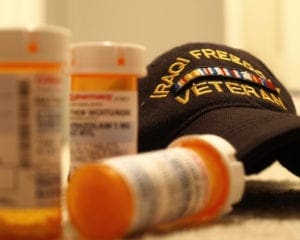Ecstasy Might Be Approved as Relief for PTSD Patients, But Why Stop There?
This article was featured in our weekly newsletter, the Liberator Online. To receive it in your inbox, sign up here.
The drug war’s consequences have produced a wide variety of ramifications.
 While low-income communities, especially in the inner cities and rural, forgotten areas of the country, are often mentioned as some of the areas mostly impacted by the criminalization of certain drugs, another group highly affected is often ignored: Veterans with Post-Traumatic Stress Disorder
While low-income communities, especially in the inner cities and rural, forgotten areas of the country, are often mentioned as some of the areas mostly impacted by the criminalization of certain drugs, another group highly affected is often ignored: Veterans with Post-Traumatic Stress Disorder
(PTSD).
A small nonprofit created in 1985 has been advocating for the use of substances such as marijuana, LSD, and MDMA — also known as ecstasy — to treat PTSD patients. The group funded Phase 2 studies and is now working on funding Phase 3. Previously, the group helped 130 patients while now, it could help a total of 230 individuals.
During Phase 2 of the study, the group focused on helping combat veterans and others including sexual assault victims who do not respond well to traditional prescription drug treatments. On average, these patients — some of whom had struggled with PTSD for 17 years — reported 56 percent decrease of severity of PTSD symptoms. In order to help a greater amount of patients suffering with the disorder, the group is applying for therapy status with the Food and Drug Administration, claiming that psychotherapy often produces similar results but only after years of implementation. With the use of these substances, this group claims, patients have a better shot at recovering in a shorter amount of time, helping these individuals get back to their lives. If approved by the government entity, the drug could be available by 2021. But even then, the drug would only be used under a limited amount of times and only for the purpose of treating PTSD.
While many scientists claim that legalizing and regulating this therapy will encourage further drug use, only part of their concern is warranted and for reasons they do not even suspect.
With the drug war, illicit drug markets were created in the shadows, allowing drug manufacturers and salesmen to deal with supply and demand in an aggressive, violent manner. Pushing markets to the shadows often has this effect, making perfectly safe substances like marijuana become the reason why violent gangs operated for decades, killing and leaving countless innocent victims homeless, often pushing them to flee their own homes as a result.
If this therapy, and only this therapy is legalized, expect to see an uptick in schemes bringing dealers and doctors together, much like what is happening now with the opioid epidemic.
Unless the official war on drugs ceases to exist and groups like the Multidisciplinary Association for Psychedelic Studies are able to experiment with all substances freely and without suffering due to government restrictions, patients who suffer from a variety of conditions won’t be able to have access to the treatment and help they deserve.




















